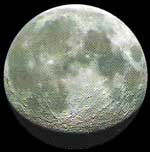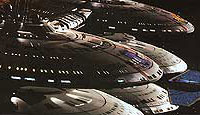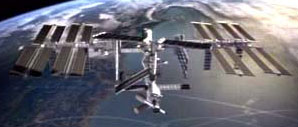Library
Luna

Luna (STSC)
Luna, commonly known simply as “the Moon,” was a Class-D world orbiting Earth.[4] By the late 24th century, more than 50 million people lived on the Moon.[3] The Talosians viewed several images about Earth’s Moon and programs to study and explore it while accessing the U.S.S. Enterprise NCC-1701‘s computer in 2254.[1] The Copernicus Ship Yards were located in orbit, with office facilities on the surface; the U.S.S. Hathaway NCC-2593 was built there.[2] Other points of interest on the Moon included Tranquility Base, where Apollo 11 landed in July 1969; as well as Lake Armstrong and New Berlin.[3] See also: Apollo program, Armstrong, Neil, Kennedy, John F., Lunar probe, Ranger probe.
References
Los Angeles
City in southern California on Earth. In the late twentieth century, the Chronowerx corporation had its headquarters located there. After the Hermosa Quake of 2047, Los Angeles and much of the surrounding area was underwater, where it became home to one of the largest coral reefs on the planet.[1]
References
Loracus Prime
Beta Quadrant planet, orbiting the star 61 Ursae Majoris, approximately 31.1 light years from Earth. This world played host to more than five thousand subspecies of termites. As such, it contained considerable arboreal flora.[1]
References
Kotara Barath
Site of a Kantare colony. A ship returning from this colony to the Kantare homeworld in 2139 was disabled by an ion storm, which killed everyone aboard except for Ezral and Liana.[1]
References
Jupiter Station

Jupiter Station (VOY-243)
Jupiter Station was in operation some prior to 2151, when the Enterprise NX-01 was expected to travel there in order to install the ship’s phase cannons.[6] MACO Corporal J. McKenzie served a six-week tour on Jupiter Station prior to 2154, where she gained experience operating in zero-gravity conditions, as the station’s grav plating would periodically fail.[7] Tuvok was temporarily stationed at Jupiter Station sometime prior to 2371. While there, he kept in contact with Kathryn Janeway through written letters.[4] Lewis Zimmerman, the man who programmed the Emergency Medical Hologram, was stationed at the Jupiter Station Holoprogramming Center.[1] Lieutenant Reginald Barclay was a member of Zimmerman’s production team, in charge of testing the EMH’s interpersonal skills.[2] Zimmerman offered to set up Leeta as the manager of the station’s cafe while on a visit to Deep Space Nine.[3] The U.S.S. Voyager NCC-74656‘s EMH, now a sentient being, visited Jupiter Station in 2376 to cure Dr. Zimmerman from an unknown disease.[5]
References
Jupiter

Jupiter (TNG-101-102)
Jupiter was the fifth planet in the Sol System. The Talosians viewed an image of the Sol System while accessing the USS Enterprise‘s computer in 2254.[1] Jupiter Outpost 92 was the first outpost to report the entrance of a Borg cube into the Sol System during the Borg Invasion of 2366.[2] Jupiter Station was in operation as early as the 2150s,[4] and by the late 24th century was home to an advanced holoprogramming facility.[3] Jupiter was Class-J, with a diameter of 142,984 kilometers. It lay 778,330,000 kilometers from Sol, and its orbit took 11.8 Earth years to complete, while one rotation took 9 hours 55 minutes. Cloudtop temperature was -150°C, and gravity was 2.64 g. Jupiter had 16 moons, including Io, Europa, Ganymede, and Callisto.[5]
References
International Space Station

International Space Station (ENT-01-02)
Orbital scientific outpost above planet Earth during the late 20th and early 21st centuries. The station, which was jointly built and operated by several nations—including some that had previously been bitter enemies—represented a significant step in the planet’s social evolution as well as its spaceflight capability. Benjamin Sisko displayed a model of Earth’s International Space Station in his office on station Deep Space Nine.[1]
References
Griffith Observatory

Griffith Observatory (VOY-150)
Located near Los Angeles, California on Earth, Griffith Observatory was constructed in the early 20th century to conduct scientific research, studying the stars visible from Earth. Tom Paris and Tuvok visited Griffith Observatory when the U.S.S. Voyager NCC-74656 was inadvertently transported to Earth in 1996. The pair encountered Rain Robinson, who worked at the observatory at the time.[1]
References
Great Barrier
The Great Barrier was an energy field that was distinct from, but related to, the Galactic Barrier. It surrounded a spherical region approximately 15,000 light-years in diamater at the center of the Milky Way Galaxy. The Great Barrier was first traversed in 2287, but the galactic core remained largely unexplored.[1, 2]
References
Glintara Sector
The Glintara Sector was known alternately as Sector 031[2] and as Sector 1607.[1] Most of the sector was claimed by the Romulan Empire, but also included a portion of the Romulan Neutral Zone. The Devolin System was located in this sector.[2]
References
Categories
- Animated Series (60)
- Articles (28)
- Books (447)
- Cast & Crew (79)
- Comics (22)
- DS9 (328)
- Early Voyages (125)
- Education (5)
- Enterprise (373)
- Excelsior (36)
- Food (19)
- Games (223)
- Klingon (70)
- Library (1,543)
- Logs (593)
- Lost Era (55)
- Medicine (18)
- Merrimac (1)
- Mirror (35)
- Miscellaneous (13)
- New Frontier (54)
- Next Generation (635)
- Original Series (681)
- Personnel (436)
- Places (369)
- Politics (12)
- Recreation (10)
- SCE (41)
- Science (1)
- Shatnerverse (9)
- Ships (455)
- Site Updates (98)
- Starfleet Academy (86)
- Stargazer (42)
- STO (61)
- Technology (45)
- Titan (59)
- To Boldly Go (1)
- TV/Film (214)
- Uncategorized (4)
- Vanguard (76)
- Voyager (236)
- Weapons (27)
- Xenology (54)